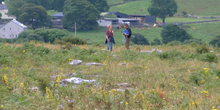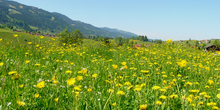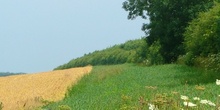Agriculture & Land Management
Our Work
Latest in Agriculture & Land Management
-

Towards sustainability: Future policies for European livestock
The CAP is failing to reward adequately those livestock farmers who produce public goods. Brexit and CAP reform are opportunities to do better.
-
Improving environmental financing via result-based agri-environment measures
A new article by IEEP explores the use of result-based agri-environment measures in the region of Baden-Württemberg, Germany. The study shows that result-based schemes can increase the environmental effectiveness and conditionality of the EU Common Agricultural Policy.
-
New PEGASUS website
Project website for EU research project PEGASUS goes live!
-
Results-based agri-environment schemes: new report and guidance handbook available
Are you interested in developing and implementing a results-based payment scheme for farmland biodiversity? Together with experts from across Europe, IEEP has produced a range of useful resources to guide the future development of results-based agri-environment schemes in the EU and beyond.
-
Result-based agri-environment measures: market-based instruments, incentives or rewards?
Result-based schemes are innovative agri-environment measures, which remunerate farmers only if they can demonstrate to have achieved the desired environmental goal. This is different from ...
-
Looking beyond Paris
The latest edition of IEEP's newsletter is now available. David Baldock argues that in the next six months the EU has a substantive role in contributing to agreement on an ambitious but credible set of SDGs and more stretching climate targets. Also: energy efficiency and security; bioeconomy; and circular economy.
-
EU research project PEGASUS - new thinking on sustainable land management
EU research project PEGASUS kicked off in London on 29-30 April. The three-year project, led by IEEP, is focused on transforming land management approaches in the EU to improve the delivery of public goods and ecosystem services from rural areas.
-
Guidelines for biodiversity proofing the EU budget
This report provides a practical framework to ensure that spending under the EU budget has no negative impacts on biodiversity, and that spending under the EU budget is overall supportive to achieving the biodiversity targets.
-
Sustainable intensification of European agriculture
The concept of sustainable intensification has come into prominence in the context of global food security. This report defines what we mean by sustainable intensification, explains its global logic, discusses what it means for EU agriculture and exemplifies this in three case studies for soil performance, nutrient recycling and biodiversity.
-
New report: High Nature Value Farming in the EU
Member States need to make the most of the opportunities under the new Common Agricultural Policy if the declines in HNV farming, critical for meeting our 2020 biodiversity targets, are to be halted.
-
Interactions between climate change and agriculture; and between biodiversity and agriculture in Europe
What should be Europe’s role in feeding the world in 2050? This IEEP report for the European Parliament describes options for increasing the productivity of European agriculture whilst adapting to climate change, reducing emissions, and providing biodiversity and ecosystem service benefits from agriculture.
-
Environment undermined in CAP deal
An attempt by the European Commission to place the environment more centrally within agricultural policy has been comprehensively watered down in the final agreement.
-
A greener CAP: still within reach?
The greening of the CAP hangs in the balance in the final negotiations; a synthesis of key issues and requirements.
-
Greening the CAP - how ‘equivalent’ are alternative approaches?
A contentious issue in the negotiations on the future of the CAP is how to implement the proposed new green direct payments to farmers. However, proposals to increase flexibility for Member States will not necessarily be administratively any simpler and may risk weakening environmental outcomes.
-
Biodiversity proofing of the EU budget
This study shows how more can be done to firstly avoid and minimize detrimental impacts of EU funding on biodiversity, and secondly to increase biodiversity benefits.
-
Principles of Double Funding
This briefing explores the issue of double funding in relation to the CAP reform debate and considers the implications for delivering added value for the environment.
-
Land Stewardship in England post 2013: CAP greening and agri-environment
What will the introduction of environmental measures in Pillar 1 mean for agri-environment schemes in the future? A topic of much debate as part of the CAP reform negotiations, this new report explores the potential impacts of greening Pillar 1 on England’s entry-level agri-environment scheme and how a future scheme could be designed to deliver more for the environment and ensure the long term sustainability of farming.
-
Designing RDPs fit for the environment
Substantial changes to rural development regulation have been proposed which provide significant opportunities for Member States to deliver more for the environment. This report highlights some of these opportunities and sets out a series of principles and environmental priorities to help guide Member States in designing their future rural development programmes.
-
Maximising environmental benefits through Ecological Focus Areas
Of the three measures proposed to 'green' Pillar 1 direct payments, Ecological Focus Areas have the greatest potential to address a range of environmental concerns. How much of this potential is realised depends on a number of key factors discussed in this new IEEP report prepared at the request of the Land Use Policy Group.
-
European Parliament report on sustainable competitiveness and innovation
The CAP could, and should, be primarily to assist EU agriculture to become more internationally competitive and sustainable and to achieve this by innovation. It already has many instruments to do this, and the reforms could further assist. However the resources deployed could be far better used.
Related
-

Debating the Future of The Common Agricultural Policy
The IEEP's platform to share thoughtful commentary and analysis on the future development of European agriculture and rural development policy.
Highlights
-

Results-based agri-environment schemes: new report and guidance handbook available
Are you interested in developing and implementing a results-based payment scheme for farmland biodiversity? Together with experts from across Europe, IEEP has produced a range of useful resources to guide the future development of results-based agri-environment schemes in the EU and beyond.
-

Result-based agri-environment measures: market-based instruments, incentives or rewards?
Result-based schemes are innovative agri-environment measures, which remunerate farmers only if they can demonstrate to have achieved the desired environmental goal. This is different from ...
-

Land Stewardship in England post 2013: CAP greening and agri-environment
